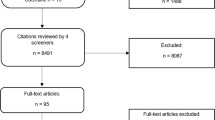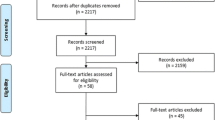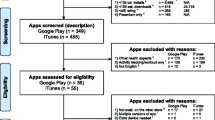Abstract
Background
Inclusion of evidence-based behavior change techniques (e.g., self-monitoring) in mobile health apps has the potential to promote adherence to inflammatory bowel disease treatment. While inflammatory bowel disease management apps exist, the extent to which they incorporate behavior change techniques remains unknown.
Aims
The present study systematically evaluated the content and quality of free, commercially available inflammatory bowel disease management apps.
Methods
Apps were identified using a systematic search of the Apple App and Google Play stores. Apps were evaluated using Abraham and Michie’s taxonomy of 26 behavior change techniques. A literature search was conducted to identify behavior change techniques specific and relevant for people with inflammatory bowel disease. App quality was assessed using the Mobile App Rating Scale with scores ranging from 1 (Inadequate) to 5 (Excellent).
Results
A total of 51 inflammatory bowel disease management apps were evaluated. Apps included 0–16 behavior change techniques (Mean = 4.55) and 0–10 inflammatory bowel disease management behavior change techniques (Mean = 3.43). App quality ranged from 2.03 to 4.62 (Mean = 3.39) out of 5.00. Two apps, My IBD Care: Crohn’s & Colitis and MyGiHealth GI Symptom Tracker, included the highest number of overall and inflammatory bowel disease management behavior change techniques along with high-quality scores. Bezzy IBD was the only app with a high number of overall and inflammatory bowel disease management behavior change techniques with a primary focus on social support/change.
Conclusion
Most inflammatory bowel disease management apps reviewed included evidence-based inflammatory bowel disease management behavior change techniques.


Similar content being viewed by others
References
Gray WN, Denson LA, Baldassano RN, Hommel KA. Disease activity, behavioral dysfunction, and health-related quality of life in adolescents with inflammatory bowel disease. Inflammatory Bowel Diseases. 2011;17:1581–1586.
Wren AA, Maddux MH. Integrated multidisciplinary treatment for pediatric inflammatory bowel disease. Children. 2021;8:169.
Greenley RN, Stephens KA, Nguyen EU et al. Vitamin and mineral supplement adherence in pediatric inflammatory bowel disease. Journal of Pediatric Psychology. 2013;38:883–892.
Hommel KA, Greenley RN, Maddux MH, Gray WN, Mackner LM. Self-management in pediatric inflammatory bowel disease: A clinical report of the North American Society for Pediatric Gastroenterology, Hepatology, and Nutrition. J Pediatr Gastroenterol Nutr. 2013;57:250–257.
Marcolino MS, Oliveira JAQ, D’Agostino M, Ribeiro AL, Alkmim MBM, Novillo-Ortiz D. The impact of mHealth interventions: Systematic review of systematic reviews. JMIR mHealth and uHealth. 2018;6:e8873.
Atreja A, Otobo E, Ramireddy K, Deorocki A. Remote patient monitoring in IBD: Current state and future directions. Curr Gastroenterol Rep. 2018;20:6.
Yin AL, Hachuel D, Pollak JP, Scherl EJ, Estrin D. Digital health apps in the clinical care of inflammatory bowel disease: Scoping review. Journal of Medical Internet Research. 2019;21:e14630.
Chang S, Hamilton M, Lees C, Atreja A. Mobile health in IBD: Enhancing care, one phone at a time. Inflammatory Bowel Diseases. 2020;26:163–166.
Jake-Schoffman DE, Silfee VJ, Waring ME et al. Methods for evaluating the content, usability, and efficacy of commercial mobile health apps. JMIR mHealth and uHealth. 2017;5:e8758.
Con D, Cruz PD. Mobile phone apps for inflammatory bowel disease self-management: A systematic assessment of content and tools. JMIR mHealth and uHealth. 2016;4:e4874.
Kelso M, Feagins LA. Can smartphones help deliver smarter care for patients with inflammatory bowel disease? Inflammatory Bowel Diseases. 2018;24:1453–1459.
Abraham C, Michie S. A taxonomy of behavior change techniques used in interventions. Health Psychology. 20080714;27:379–387.
Gardner B, Wardle J, Poston L, Croker H. Changing diet and physical activity to reduce gestational weight gain: a meta-analysis. Obesity Reviews. 2011;12:e602–e620.
McEwan D, Harden SM, Zumbo BD et al. The effectiveness of multi-component goal setting interventions for changing physical activity behaviour: a systematic review and meta-analysis. Health Psychology Review. 2016;10:67–88.
Ramsey RR, Caromody JK, Voorhees SE et al. A systematic evaluation of asthma management apps examining behavior change techniques. J Allergy Clin Immunol Pract. 2019;7:2583–2591.
Gamwell KL, Kollin SR, Gibler RC et al. Systematic evaluation of commercially available pain management apps examining behavior change techniques. Pain. 2021;162:856–865.
Noser AE, Klages KL, Gamwell KL, Brammer CN, Hommel KA, Ramsey RR. A systematic evaluation of primary headache management apps leveraging behavior change techniques. Cephalalgia. 2022;42:510–523.
Abraham C, Susan Michie. A taxonomy of behavior change techniques used in interventions. Health Psychology. 20080714;27:379–387.
Hennessy EA, Johnson BT, Acabchuk RL, McCloskey K, Stewart-James J. Self-regulation mechanisms in health behavior change: A systematic meta-review of meta-analyses, 2006–2017. Health Psychology Review. 2020;14:6–42.
Lancaster K, Abuzour A, Khaira M et al. The use and effects of electronic health tools for patient self-monitoring and reporting of outcomes following medication use: Systematic review. Journal of Medical Internet Research. 2018;20:31–31.
Morrison D, Wyke S, Agur K et al. Digital asthma self-management interventions: A systematic review. Journal of Medical Internet Research. 2014;16:e2814.
van Vugt M, de Wit M, Cleijne WH, Snoek FJ. Use of behavioral change techniques in web-based self-management programs for type 2 diabetes patients: Systematic review. Journal of Medical Internet Research. 2013;15:e2800.
de Jong MJ, van der Meulen-de Jong AE, Romberg-Camps MJ et al. Telemedicine for management of inflammatory bowel disease (myIBDcoach): a pragmatic, multicentre, randomised controlled trial. The Lancet. 2017;390:959–968.
Hommel KA, Hente EA, Odell S et al. Evaluation of a group-based behavioral intervention to promote adherence in adolescents with inflammatory bowel disease. Eur J Gastroenterol Hepatol. 2012;24:64–69.
Vernon-Roberts A, Frampton C, Gearry RB, Day AS. Development and validation of a self-management skills assessment tool for children with inflammatory bowel disease: The inflammatory bowel disease-skills tasks and abilities record (IBD-STAR). Journal of Pediatric Gastroenterology and Nutrition. 2021;72:67–73.
Stoyanov SR, Hides L, Kavanagh DJ, Zelenko O, Tjondronegoro D, Mani M. Mobile app rating scale: A new tool for assessing the quality of health mobile apps. JMIR mHealth and uHealth. 2015;3:e3422.
Chavez S, Fedele D, Guo Y et al. Mobile apps for the management of diabetes. Diabetes Care. 2017;40:e145–e146.
Dogruel L, Joeckel S, Bowman ND. Choosing the right app: An exploratory perspective on heuristic decision processes for smartphone app selection. Mobile Media & Communication. 2015;3:125–144.
Koo TK, Li MY. A guideline of selecting and reporting intraclass correlation coefficients for reliability research. J Chiropr Med. 2016;15:155–163.
Graham M, Milanowski A, Westat J. Measuring and Promoting Inter-Rater Agreement of Teacher and Principal Performance Ratings.; 2014.
Barlow C, Cooke D, Mulligan K, Beck E, Newman S. A critical review of self-management and educational interventions in inflammatory bowel disease. Gastroenterology Nursing. 2010;33:11–18.
Tran L, Mulligan K. A systematic review of self-management interventions for children and adolescents with inflammatory bowel disease. Inflammatory Bowel Diseases. 2019;25:685–698.
Beard JA, Franco DL, Click BH. The burden of cost in inflammatory bowel disease: A medical economic perspective and the future of value-based care. Curr Gastroenterol Rep. 2020;22:6.
Zhen J, Marshall JK, Nguyen GC, Atreja A, Narula N. Impact of digital health monitoring in the management of inflammatory bowel disease. J Med Syst. 2021;45:23.
Stark LJ, Hommel KA, Mackner LM et al. Randomized trial comparing two methods of increasing dietary calcium intake in children with inflammatory bowel disease. Journal of Pediatric Gastroenterology and Nutrition. 2005;40:501–507.
Depont F, Berenbaum F, Filippi J et al. Interventions to improve adherence in patients with immune-mediated inflammatory disorders: A systematic review. PLOS ONE. 2015;10:e0145076.
Gohil S, Majd Z, Sheneman JC, Abughosh SM. Interventions to improve medication adherence in inflammatory bowel disease: A systematic review. Patient Education and Counseling. 2022;105:1731–1742.
Kamp KJ, Luo Z, Holmstrom A, Given B, Wyatt G. Self-management through social support among emerging adults with inflammatory bowel disease. Nurs Res. 2019;68:285–295.
Plevinsky JM, Greenley RN, Fishman LN. Self-management in patients with inflammatory bowel disease: strategies, outcomes, and integration into clinical care. Clin Exp Gastroenterol. 2016;9:259–267.
El-Gayar O, Ofori M, Nawar N. On the efficacy of behavior change techniques in mHealth for self-management of diabetes: A meta-analysis. Journal of Biomedical Informatics. 2021;119:103839.
Michie S, Richardson M, Johnston M et al. The behavior change technique taxonomy (v1) of 93 hierarchically clustered techniques: Building an international consensus for the reporting of behavior change interventions. Annals of Behavioral Medicine. 2013;46:81–95.
Funding
This work was supported by the National Institute of Child Health and Human Development at the National Institutes of Health [T32 HD 68223-7 to A.E.N.] and the National Heart, Lung, and Blood Institute at the National Institutes of Health [K23 HL139992 to R.R.R.].
Author information
Authors and Affiliations
Contributions
AEN [study conceptualization & design, data acquisition, analysis, & interpretation, drafting, revising, & review of manuscript], BDL [data acquisition & interpretation, revising & review of manuscript], KAH [study conceptualization & design, data interpretation, revising & review of manuscript], CMR [data acquisition, revising & review of manuscript], JAK [data acquisition, revising & review of manuscript], EA [data acquisition, revising & review of manuscript], EMF [study conceptualization, data interpretation, revising & review of manuscript], and RRR [study conceptualization & design, data analysis & interpretation, drafting, revising, & review of manuscript].
Corresponding author
Ethics declarations
Conflict of interest
The authors have no conflicts of interest to disclose.
Additional information
Publisher's Note
Springer Nature remains neutral with regard to jurisdictional claims in published maps and institutional affiliations.
Supplementary Information
Below is the link to the electronic supplementary material.
Rights and permissions
Springer Nature or its licensor (e.g. a society or other partner) holds exclusive rights to this article under a publishing agreement with the author(s) or other rightsholder(s); author self-archiving of the accepted manuscript version of this article is solely governed by the terms of such publishing agreement and applicable law.
About this article
Cite this article
Noser, A.E., Lancaster, B.D., Hommel, K.A. et al. Use of Behavior Change Techniques and Quality of Commercially Available Inflammatory Bowel Disease Apps. Dig Dis Sci 68, 2908–2920 (2023). https://doi.org/10.1007/s10620-023-07884-7
Received:
Accepted:
Published:
Issue Date:
DOI: https://doi.org/10.1007/s10620-023-07884-7




